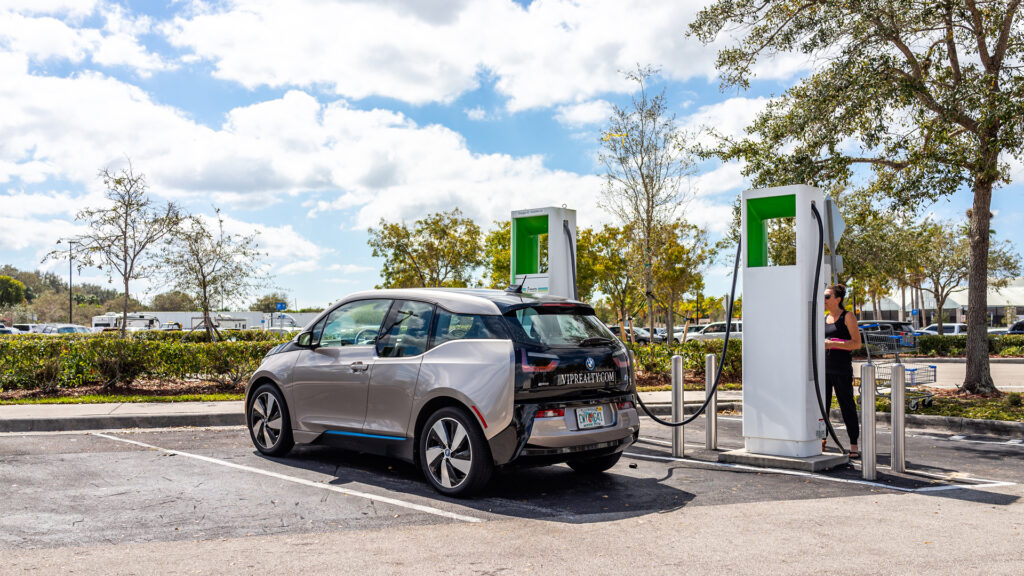By John Burr, Jacksonville Climate Coalition
Way back when, my family played the “find the license plate” game while beating back boredom on a long family drive. The idea was to check off the most number of state plates, from further away the better.
Today I play a new version of that game – “count the EVs” among the passing cars.
This is not a game for the attention impaired. I’d guess about one in 100 cars I see are electric these days, better than last year but still a far cry from the far-too-optimistic projections of the EV transition from recent past.
Now consider Norway, which according to the Washington Post, citing vehicle registration data, is the first country in the world to have more electric than gas-powered cars on the road.

This statistic comes with a big asterisk, but still it’s significant. In Norway, about 33% of the cars run on diesel fuel – a fossil fuel but not gasoline. Yeah, this is a squirrely way of claiming you have more electric than gas powered cars, but still …
Of the 2.8 million cars owned in Norway, 26.3% are fully electric. In the U.S., it’s 1.2% of our cars and trucks, according to J.D. Power as cited in the Post. So, I guessed right, about one in 100 vehicles here are electric.
Playing “find the EVs” in Norway is a much easier game. Probably boring, actually. Electric cars are all over the place.
Meanwhile, big American and European automakers this year have scaled back ambitious plans to build electric cars and trucks because not as many people are buying them as automakers anticipated.
The high cost of electrics, high interest rates, sluggish growth in EV charging networks, and yes, even political turbulence have all contributed to a cooled off market for electrics in this country.
Still, 7% of new car sales in the U.S. in 2023 were electric, and that percentage will rise this year – just not as fast as once thought.
For most early adopters, helping the environment by supporting clean transportation has been a strong incentive to own an electric car. But are climate concerns enough to convince a majority of drivers to turn toward electric cars?
Clearly not. Saving the world’s climate will not win the masses over, but saving time and money will. And, not to be underestimated, driving an electric car is a blast.
EV drivers love charging their cars for a fraction of what a gas fill up costs, and the maintenance costs of electrics is much lower than gas-powered vehicles. The fact that public chargers are limited is tapping the brakes on electric car sales for now. But that problem will eventually be solved.
Electric cars cost more, it’s true, but that won’t last. Chinese automakers already make and sell electrics for under $20,000. European and American manufacturers will figure out how drive down prices soon enough.

In the meantime, the U.S. has tacked on 100% tariffs (and in Europe, similar tariffs are expected soon) on Chinese electrics to keep them from flooding into our markets and blowing up domestic carmaker markets and profits. So obviously, the carmakers believe that demand for EVs will take off when the prices come down, as has occurred in China.
Over the next 20 years there will be many twists and turns, dips and surges as our cars and trucks and motorcycles and lawn mowers and farm equipment and boat motors and even our planes transition to electric power. How fast this happens is mostly guesswork, but what’s certain is the trajectory. Electrification of transportation (and manufacturing and home heating and cooling) is the future because it is far more efficient, and less polluting than burning oil, coal and gas.
I probably won’t live to see this but my son and daughter will – when families on the road try to spot the ICE cars – internal combustion engines. That “one in 100” ratio – gas to electric power – is no game but an essential step to curb carbon pollution and cool down our planet.
John Burr is the editor of the Jacksonville Climate Coalition newsletter. He also writes a Substack newsletter called Radical Green Zealots (johnburr.substack.com), where this piece first appeared. Banner image: An sign showing the location of an electric vehicle charging station (iStock image).
If you are interested in submitting an opinion piece to The Invading Sea, email Editor Nathan Crabbe at ncrabbe@fau.edu. Sign up for The Invading Sea newsletter by visiting here.



